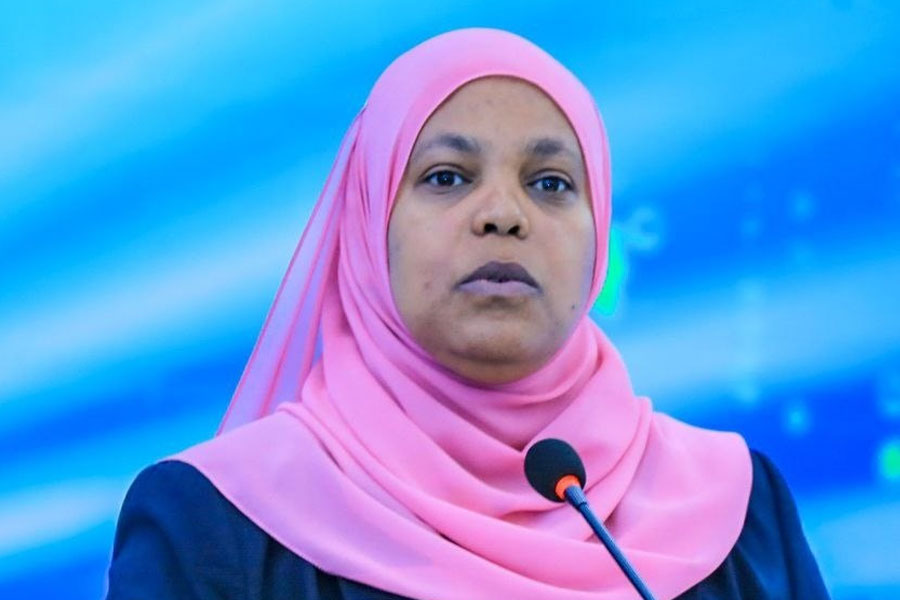
In-Picture | Jul 14,2025
Oct 28 , 2023
By AKSAH ITALO ( FORTUNE STAFF WRITER )
Companies interested in multimodal transportation have a rare opportunity that opened after the Ethiopian Maritime Authority decided to onboard capital and enhance logistics capabilities across the eight dry ports.
About 13 local companies have shown interest in the second bid, with notable names like the Ethiopian Railways Corporation, Maccfa Freight Logistics, Panafric Global and National Transport Plc making the list.
With only a month left, officials believe the move will allow private companies to share in the logistics business monopolised by state-owned Ethiopian Shipping & Logistics.
Yalew Tesfaye, CEO of the logistics administration at the Authority, indicates that extensive reforms have been tabled as part of a national strategy to improve Ethiopia's trade potential by including multi-use logistics modalities.
He revealed that four operational licences will be given to the private sector over the coming five years, with capable companies providing a diverse alternative, hopefully resulting in private operators shipping containerised cargo.
While joint ventures between local and foreign investors are allowed, the selected companies are subject to a rigorous set of requirements, including a board of directors with a minimum of five years of experience. Companies are required to lease five hectares of land at the ports and have 30 trucks with the capacity to acquire 40 more with 400qtl carrying capacity.
Logistics companies recognise the lucrative business opportunity, although it is too early to comment on the arrangement.
Maccfa Freight Logistics has been operating in a joint venture with Siva Shipping & Transport for nearly three decades.
Although Board Chairman Mulugeta Assefa applauds the attempt after half-hearted efforts in the past 15 years, he believes the bid requirements are exaggerated and exclusionary to local companies.
"It's unlikely that anyone makes the cut," he told Fortune.
Maccfa has seven offices across the country and provides services through its own 15 trucks. While Mulugeta said they lease more when necessary he disclosed the company primarily relies on providing "soft skills" for its revenues.
Mulgueta indicates that multimodal transport will significantly help decrease waiting times and document authentication backlogs. However, he emphasised that the requirements need adjustment to factor in skills, network, knowledge and experience.
"This is what matters more," he said.
The inclusion of multimodal transport into the logistics sector a decade ago has heralded improved timeliness and better tracking and tracing capabilities. At the same time, it has been dominated by the six-decade-old state-owned behemoth Ethiopian Shipping & Logistics which amassed 42.7 billion Br in revenues last year.
Communication Director Demsew Benti said the inclusion of the private sector will bring options for customers and compete for their company.
"We are already improving our organisational structure and expanding our transit corridor," he said.
The Mojo dry port dominates the multimodal sector with 90pc of the market share at 100 million dollars of annual cargo. According to the 10-year strategy by the Ministry of Transport & Logistics, three others will be developed at Jimma, Hawassa and Asosa towns.
Poor existing infrastructure and lack of basic infrastructures, congestion of dry ports, inefficient freight vehicles, lengthy and inefficient custom clearance process, and lack of competition in multimodal transport service have long been a complaint of importers.
Israel Taye, general manager of Elay Trading Plc, said rising shipment costs and tedious customs procedures are consistent challenges for the company that has been importing laboratory, scientific and agricultural equipment for the past seven years.
He welcomes the inclusion of alternatives for his logistics needs as haphazard labelling of chemicals and the requirement to separate them into different containers is subject to sixfold increases in shipping costs.
"It will be good to have options," he said.
As Ethiopia relies on Djibouti for 90pc of its imports logistics experts such as Matios Ensermu (PhD) who have long called for diversification in the sector welcomed the recent shift towards private sector involvement.
Matios observes the stride towards liberalisation is a positive step to make way for inland water transport and improved services at dry ports. The logistics expert underscored that investments will be required in expanding road infrastructures, amplifying the rail network and improving urban transport infrastructure.
"Most of the infrastructure has remained monopolised," he said.
Matios did not shy away from mentioning the importance of restoring diplomatic relations with Eritrea to expand logistics operations. But he recommends the revitalisation of internal infrastructures be given priority.
"It all starts from the inside," he told Fortune.
Editors' Note: This article was updated from its original version on October 30, 2023.
PUBLISHED ON
Oct 28,2023 [ VOL
24 , NO
1226]

Viewpoints | Jun 14,2025

Agenda | Nov 03,2024

Fortune News | Jun 21,2025

Radar | May 27,2023

Fortune News | Feb 18,2024

Dec 22 , 2024 . By TIZITA SHEWAFERAW
Charged with transforming colossal state-owned enterprises into modern and competitiv...

Aug 18 , 2024 . By AKSAH ITALO
Although predictable Yonas Zerihun's job in the ride-hailing service is not immune to...

Jul 28 , 2024 . By TIZITA SHEWAFERAW
Unhabitual, perhaps too many, Samuel Gebreyohannes, 38, used to occasionally enjoy a couple of beers at breakfast. However, he recently swit...

Jul 13 , 2024 . By AKSAH ITALO
Investors who rely on tractors, trucks, and field vehicles for commuting, transporting commodities, and f...

Oct 11 , 2025
Ladislas Farago, a roving Associated Press (AP) correspondent, arrived in Ethiopia in...

Oct 4 , 2025
Eyob Tekalegn (PhD) had been in the Governor's chair for only weeks when, on Septembe...

Sep 27 , 2025
Four years into an experiment with “shock therapy” in education, the national moo...

Sep 20 , 2025
Getachew Reda's return to the national stage was always going to stir attention. Once...